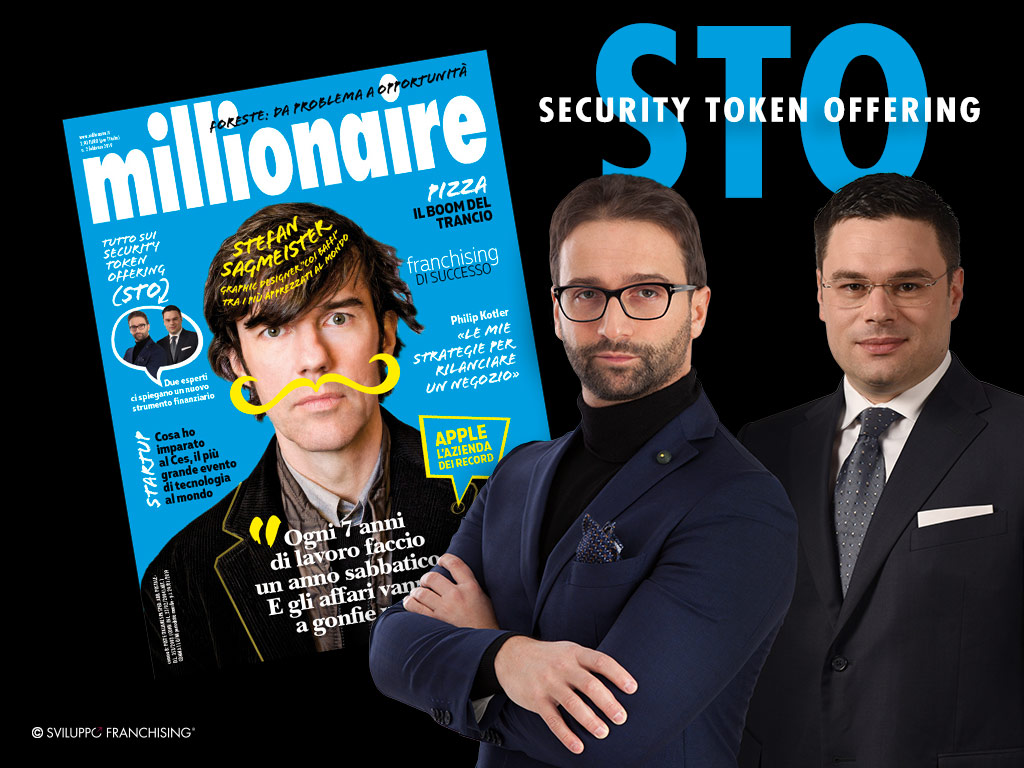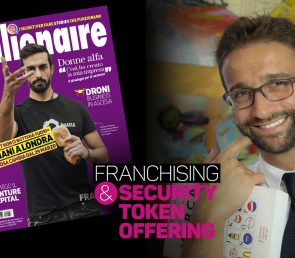
Franchise Development presents its new crypto-finance service: Security Token Offering Advisor
Franchise Development is the first Italian franchising consultancy company to provide advisory services on security token offerings. The idea of expanding the range of services, thus making it possible to connect franchising networks with the new financial instrument of STOs, was conceived by Davide D’Andrea Ricchi, CEO of the company. This became possible thanks to a close partnership with Andriotto Financial Services, headed by Mauro Andriotto, a Swiss company specializing in crypto-finance, euro project management, and blockchain.
Security token offerings are technical procedures that allow the sale of financial instruments to the investing public through digital tokens. Unlike other blockchain entities, these tokens represent real “securities (stocks, shares, bonds, etc.)” that behave similarly to liquid assets, providing the right to receive future financial flows.
To delve deeper into the topic, below is an excerpt from an interview conducted by the CEO of Franchise Development and Professor Mauro Andriotto in the national magazine Millionaire, February 2019 edition, pp. 70-71-72.
Differences compared to traditional operations?
“There are advantages of blockchain decentralization compared to intermediaries (banks, advisors, exchanges). Additionally, there are lower issuance and management costs, the possibility of obtaining a higher price from sellers, reduced capital costs, and increased company (or asset) value.”
How does a company issue an STO?
“As a first step, a company can issue security tokens following the standard procedure for issuing financial instruments to the public, which generally involves (according to varying methods from country to country) the publication of a prospectus.
The second step is to link the token to securities through the blockchain. The third is token listing. Today, the only exchanges allowing the listing of security tokens are platforms dedicated to institutional investors. However, numerous exchanges worldwide (London, Zurich, Malta, Gibraltar) have initiated procedures to accept listings of digital securities offered to the public.
Regarding trading and exchanges, a differentiation will be created between centralized and decentralized exchanges, just as it already occurs for ICOs. However, the significant difference is that in the decentralized field, there will no longer be intermediaries (such as banks and stock exchanges), with their respective commissions, and the exchange between two parties (seller and buyer) can be regulated by a smart contract (an algorithm) through a cryptocurrency, which initially could be a stable coin (stable-priced).”
Compared to IPOs and private equity?
“Tokens provide the opportunity to easily create innovative financial products through smart contracts and cryptocurrencies, where flows (such as dividends) can automatically be directed to the wallet of token holders, with simplified management procedures, including administrative. The procedure of offering through digital tokens presents several advantages: low issuance costs, similar to private equity, the possibility of obtaining a higher price, similar to an IPO, and short timelines, similar to private equity.”
Where can the issuance of STOs be communicated?
“The company communicates the issuance through the deposit of an information prospectus, which is a legal document (in Europe to be drawn up according to Regulation 2017/1129) describing the company’s business lines, economics, share structure, and securities to be issued.”
How can STOs be purchased?
“Security token types can be purchased through smart contracts or fiat money at the discretion of the issuer. Additionally, as with traditional financial instruments, they can be purchased either during the initial issuance phase or, once listed, on the open market for trading, which could be centralized or (later) decentralized.”
Protections and advantages for an investor?
“Protections include the prospectus. Legislation on offering financial instruments to the public is regulated in all developed countries. In Europe, the filing of an information prospectus, drawn up according to precise standards, is required, with responsibilities towards investors. Analysis is essential. The STO must be analyzed starting from the company and the underlying project: it must be of quality and justify the investment in terms of expected returns and risks.
Advantages are linked to the digital nature of the token and decentralization:
a) Rapid disinvestment.
b) (on decentralized platforms) Sending security tokens to identified parties, for example, sending shares to a relative without going through a bank and notary.
c) Lower costs (no commissions, or very low costs).”
Risks?
“Similar to traditional risks. To purchase a security, it is necessary to rely on a consultant or be an expert in the field to adequately assess the investment. Another risk is cyber security. However, security tokens, at least initially, could be transferred within ‘closed circuits’, where participants access after passing through a Know Your Customer – KYC procedure. There are best practices available regarding the use of private keys for electronic wallets and the type of electronic wallets to use. Another real risk is the reliability of the company.”
How is the company issuing STO evaluated?
“Financial analysis is necessary to assess its reliability level. Due diligence is necessary to understand if the risk-return level associated with the instrument is in line with one’s expectations and strategies. DIY requires careful preparation and industry study. Specialized consultants are available, which may be useful to consult.”
Can STOs be converted into traditional currencies or cryptocurrencies?
“Tokens can be sold against traditional currency or against cryptocurrency at the discretion of the seller. However, to use smart contracts or automated procedures, cryptocurrency is required. Transactions can be conducted privately, through a traditional contract, or through an exchange, following appropriate KYC.”
Are there reference regulations on the issuance of STOs in Italy?
“At the moment, there are no dedicated regulations, but unlike ICOs, there are strict reference regulations both at the Italian and European levels concerning the public offering of securities, which also includes tokens representing securities.”





